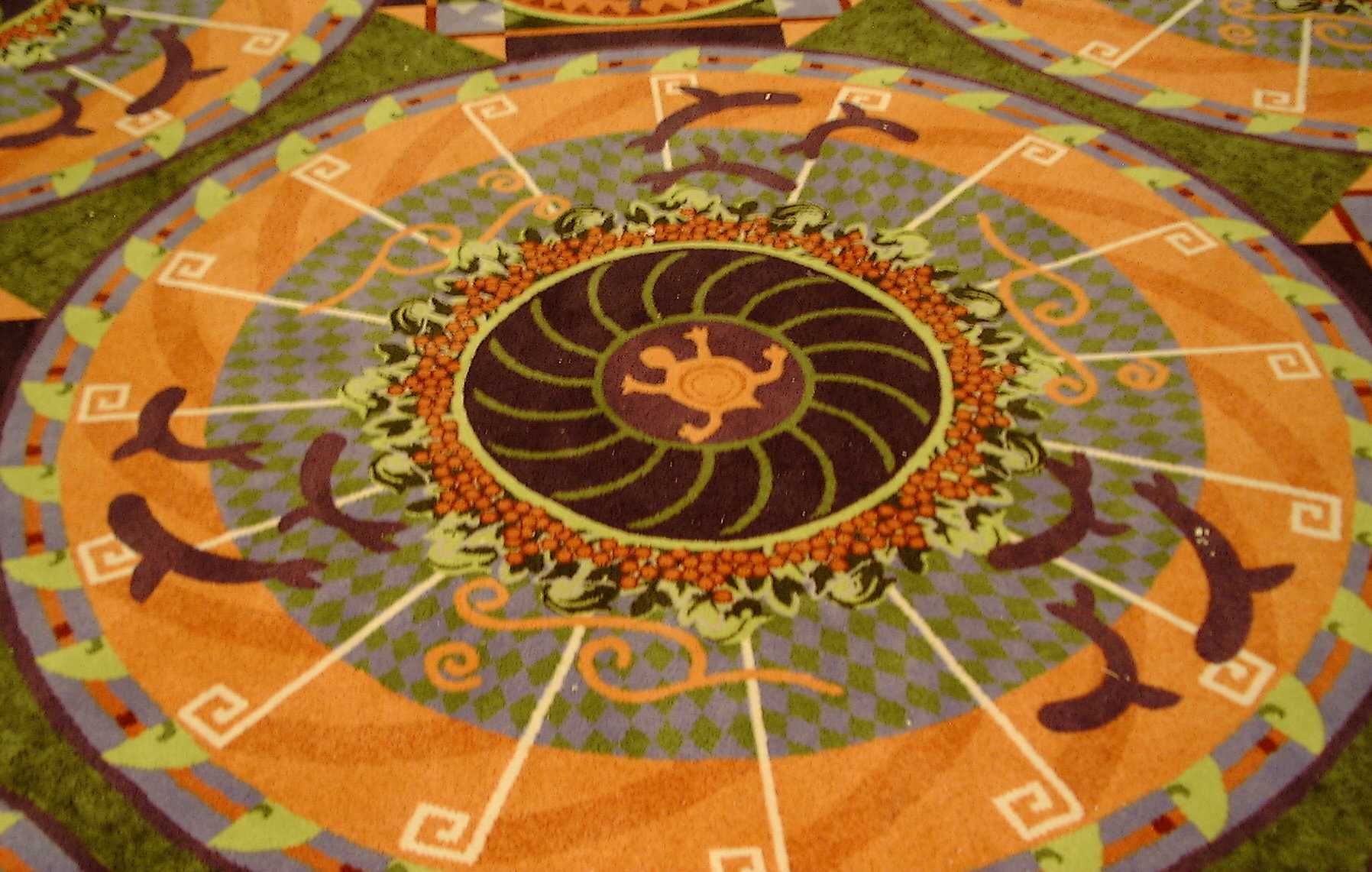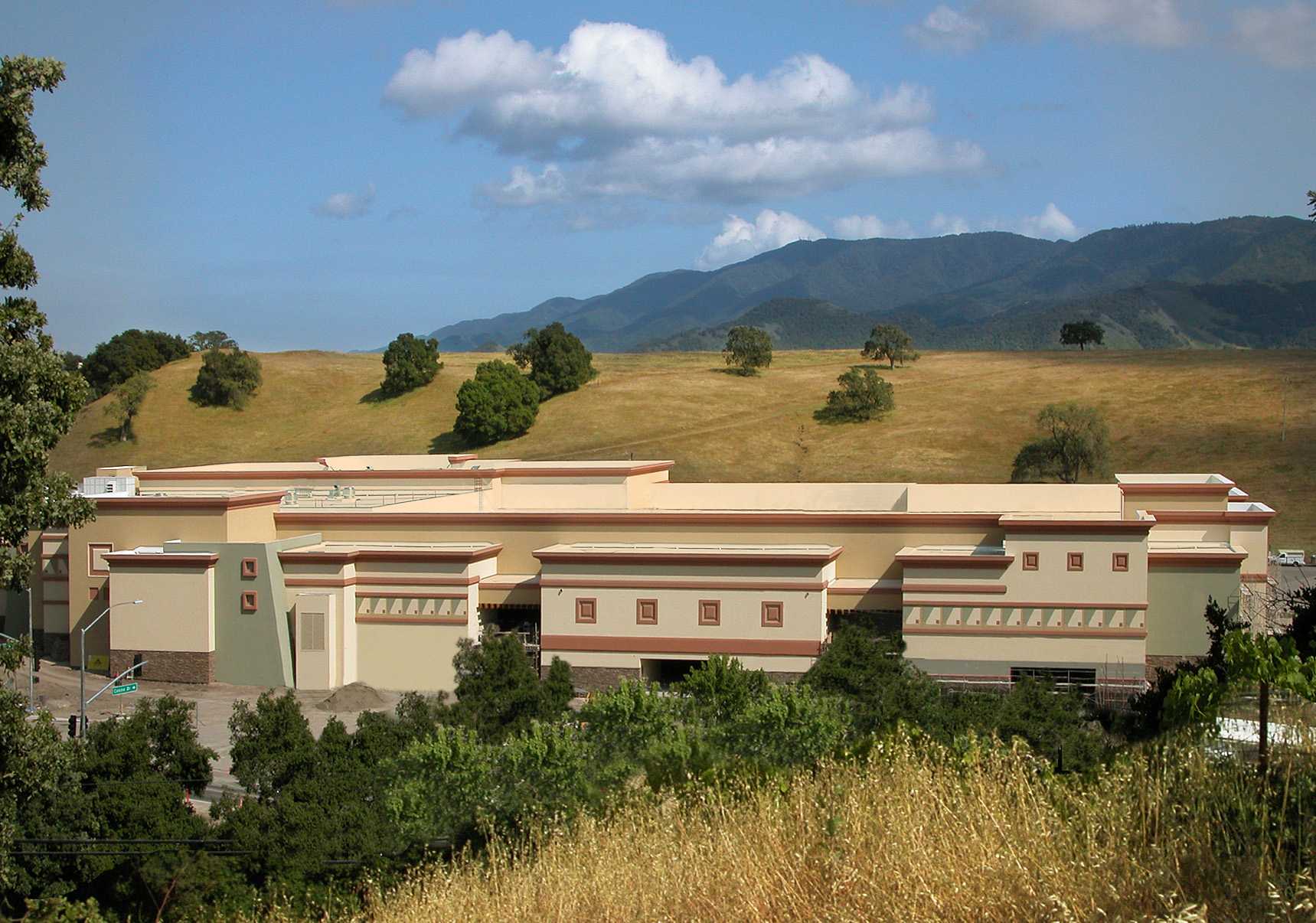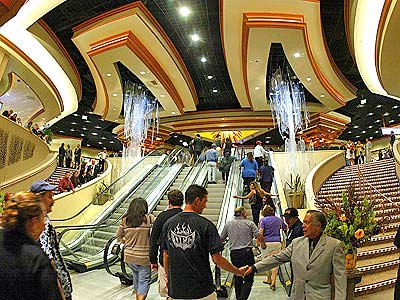 Another Stereotype of the Month entry:
Another Stereotype of the Month entry:
 Another Stereotype of the Month entry:
Another Stereotype of the Month entry:
Santa Barbara News-Press -- January 14, 2003
Casino gaming gambling on rules
ANDY ROSE
1/14/03
I think gambling is a lot of fun, but I try to never let it get out of hand, which is a good thing, because I'm no Amarillo Slim.
I make the occasional trip to Las Vegas, but I know better than to count on victory.
For that, you apparently have to go to the Chumash casino, and you have to know powerful people. I've done the former, but I have very little hope of the latter, and maybe that explains why I had my pockets emptied the few times I gambled in Santa Ynez.
Who knows what goes on within the confines of the casino, but the news out of the American Indian tribe's wildly successful gambling hall makes you wonder if everything's on the up and up.
In December, Tribal Chairman Vincent Armenta allegedly took a few buddies to the casino, where they proceeded to gamble with house money.
Kind of takes the sport out of it, doesn't it? If there's no chance of defeat, is gambling as much fun?
The tribe's internal gaming commission is investigating and some of the employees involved were suspended, but then came more news of alleged hanky-panky. On Monday, we found out that a former security official sued the tribe after he was fired in February, allegedly after reporting problems with the gambling operation.
The ex-employee claimed that casino officials fixed slot tournaments, rigged car giveaways, hired convicted felons, and told winners how to conceal their take from the tax collector.
There is a lot of money to be made in this enterprise. The tribe routinely declines to release information about their profits, or anything else, but the News-Press reported last year that the casino netted more than $50 million in 2000. Much of the proceeds are divided up among tribal members, who average six-figure incomes as a result.
There is a lot o' green flying around the joint.
And very little government oversight, because the tribe is a "sovereign nation."
This means they thumb their noses at local government regulations, cite racism as the basis for any criticism and do strange things such as sending a letter to the adjacent Santa Ynez Airport, warning them to reroute flights away from their "sovereign airspace."
Fortunately, they have no Stinger missiles ... yet.
In light of that history, the problems seem like they were entirely predictable to me.
Let's break it down to very simple statements:
The tribe opens a casino. They rake in huge sums of money. Nobody watches to make sure everything's legal.
Hmm, what do you think might happen?
In the classic Las Vegas movie "Casino," psycho mobster Joe Pesci sits at a blackjack table late at night, drunk and vicious. He swears when he gets a losing hand, flips the unwanted card in the dealer's face and orders him to deal another.
Nobody stops him, maybe because they remember the time in the casino bar when he killed a guy by stabbing him over and over in the neck with a fountain pen.
Let's hope that wouldn't work in Santa Ynez.
Andy Rose is the News-Press city editor. His column runs on Monday and Tuesday. He can be reached at 564-5274 or by e-mail at arose@newspress.com.

The Chumash respond
Editorial News
Chumash casino is not old-style Las Vegas
Voice From SANTA YNEZ; Gilbert Cash
1/20/03
In his Jan. 14 column, "Casino gaming gambling on rules," Andy Rose may be trying to do his best impression of Andy Rooney from "60 Minutes," but we're not laughing.
To compare our casino to the casinos run by mobsters of old-time Las Vegas is not only insulting, it's simply inaccurate. Or, in Mr. Rose-speak, it's "wildly inaccurate."
For starters, the National Indian Gaming Commission, the federal agency that oversees Indian gaming facilities throughout the nation, completed its investigation of the Dec. 7 incident involving Chairman Vincent Armenta and concluded that the tribe's Gaming Commission took the appropriate steps in investigating the situation and making its recommendations.
Should we repeat ourselves so Mr. Rose and his readers understand? After reviewing the situation, the NIGC concluded that it agreed with the tribe's Gaming Commission's findings.
It's obvious by Mr. Rose's statements that he doesn't understand just how regulated Native American gaming is. He wrote that the tribe's casino "has very little government oversight" and "nobody watches to make sure everything's legal."
Both statements are untrue. In fact, Native American gaming is one of the most heavily regulated industries and is more regulated than commercial gaming. Native American gaming has three levels of regulation:
* The first comes from the tribes themselves. With the establishment of the Indian Gaming Regulatory Act (IGRA), tribes are mandated to establish a regulatory body (tribal regulators and commissions) to keep operations in compliance with local ordinances and state compacts.
* The second is the state. The California Gambling Control Commission, under the Gambling Control Act, has jurisdiction over operation, concentration and supervision of gambling establishments, and over all persons or things having to do with the operations of gambling establishments in California. In addition, the Division of Gambling Control, within California's Attorney General's Office, regulates legal gambling activities in California to ensure that gaming is conducted honestly, competitively and free from criminal and corruptive elements.
* The third is the National Indian Gaming Commission, which founded in February 1993 to oversee the regulation of Indian gaming. Other oversight entities include the federal government, the Department of Justice, FBI and Bureau of Indian Affairs.
We certainly don't thumb our noses at local government regulations, as Mr. Rose charges. In fact, our tribe has worked diligently with representatives from various local government bodies, developing strong government-to-government relationships to ensure that we continue to meet the needs of the community as we proceed with our casino construction project.
Mr. Rose also comments about the fact that the proceeds of our profits are divided up among tribal members. What's the difference between that and shareholders of a business enterprise receiving dividend checks as a result of a profitable business? It should be noted that the per-capita payments represent a small percentage of the casino operation's total gross revenues.
Of course, Mr. Rose conveniently failed to mention that the Santa Ynez Band of Chumash Indians also uses the revenues from its gaming activities to fund much-needed tribal programs in the areas of education, health and culture. Nor did he mention the significant donations we generously provide to nonprofit groups throughout the county — contributions that total millions of dollars over the past several years.
In addition, the tribe also contributes to the Special Distribution Fund, which was created to help mitigate the effects that gaming has on communities. From that fund, money is distributed back into the communities where Native American gaming facilities are located. The Chumash tribe, along with all other gaming tribes in California, also contributes to the Indian Gaming Sharing Trust Fund, which is designed to share the wealth with California tribes without gaming facilities.
Gilbert Cash, the tribe's Gaming Commission chairman, is also a Santa Barbara city firefighter. He has lived in Santa Ynez since 1979.

The News-Press backs off
Local News
One strong opinion not shared by paper
JERRY ROBERTS
2/13/03
Putting out a daily newspaper is roughly equal to publishing a 300-page book, on deadline, 365 days a year.
The News-Press staff does an excellent job processing mountains of information every day, but pressure to do so in time to get the morning paper in your driveway means that occasional mistakes creep in. When they do, we do our best to acknowledge and to correct them, fully and promptly, on this page.
For an editor, factual inaccuracies are maddening, though relatively straightforward to correct. Other issues arising from stories may not be so clear cut. Sometimes, we fall short of our own journalistic standards, not because of misspelling a name or misreporting a phone number, but because of an error in editorial judgment.
That judgment proved faulty last month, when we ran an editor's column of strong opinion in this space about the casino run by the Santa Ynez band of Chumash Indians and Vincent Armenta, the tribe's leader. Spinning off of recent news events involving the casino, the piece was harshly critical of both, a personal column that represented the personal views of the editor, not those of the paper.
Shortly after it ran, Mr. Armenta and several of his colleagues made an appointment to come down and discuss it with me at the News-Press. In the meeting, they raised a number of concerns, while I explained some of the difficulties we've encountered in reporting on the tribe. It was a good exchange and, when it was over, I felt they had made some legitimate criticisms that should be aired.
Most important, although clearly an opinion piece, the column was written by the editor in charge of local, straight newsgathering and published in the news section. Opinions, especially strong ones, have an important place in the newspaper. But it is a newspaper's journalistic responsibility to make as clear as possible precisely where the line between news and opinion lies.
We do not believe that any reader had difficulty seeing that line in this instance, but our adherence to the journalistic standards to which we look for guidance would have been tighter had we labeled the column as opinion, or put it on the op/ed page.
Factually, the piece also overreached at one point, in asserting that "nobody watches to make sure everything's legal" at the casino; in fact, several agencies — including the California Gambling Control Commission, the Division of Gambling Control within the state Department of Justice, and the National Indian Gaming Commission, in addition to a tribal regulatory body — exercise governmental oversight.
For the record, we apologize for that factual error, and also wish to make clear that neither the News-Press nor the column stated, implied or concluded that Mr. Armenta broke the law.
In the news trade, Mr. Armenta is what is known as a public figure, and the First Amendment to the Constitution gives newspapers, and everyone else for that matter, latitude to express a range of statements and opinions about him that is broader than that applying to private citizens.
Legally, we were well within our rights to publish the piece. Journalistically, however, we failed to meet our own standards.

The final outcome
From the LA Times:
THE CHUMASH | SUDDEN WEALTH
Editor Draws Tribe's Wrath
By Glenn F. Bunting
Times Staff Writer
December 25, 2004
SANTA YNEZ, Calif. — Andy Rose says he had no idea that lambasting the Chumash Indians over the management of their casino could cost him his job.
In a column in the Santa Barbara News-Press, Rose chastised tribal chairman Vincent Armenta for directing a blackjack dealer to provide free chips for Armenta's then-18-year-old son and other patrons.
"Kind of takes the sport out of it, doesn't it?" Rose wrote in his Jan. 14, 2003, column.
Rose, then the paper's city editor, went on to say that tribal leaders "thumb their noses" at local government regulations, rake in huge sums of money while "nobody watches to make sure everything's legal," and cry "racism" whenever they are criticized.
Rose closed by invoking a character from the movie "Casino," a mobster who is dealt a losing hand and responds by tossing a card in the dealer's face and demanding a new one.
Leaders of the Chumash tribe say they would have ignored such an attack years earlier. This time, they fought back, demanding an apology, branding Rose a "racist" and urging his dismissal during a meeting with the executive editor.
"There's been an increasing bias in the media against gaming tribes," said Frances Snyder, a Chumash spokeswoman who attended the meeting. "We will continue to raise concerns whenever we see it."
The meeting with then-executive editor Jerry Roberts occurred about a week after Rose's column ran. Within two weeks, Rose resigned under pressure. Roberts then disowned the column, writing that it "failed to meet our own standards."
Rose, 47, who is on leave from a part-time job at a Salinas radio station, said: "I think it is pretty obvious that the Chumash had something to do with my termination."
In a past dispute with the News-Press, the tribe had withdrawn its casino advertising. Roberts said concerns over advertising played no role in Rose's departure.
He said Rose was forced out for reasons unrelated to the column on the Chumash. Roberts, now editor and publisher of the News-Press, declined to elaborate.
Rose joined the Santa Barbara paper in July 2001. He had previously been an editor and reporter for the Los Angeles Times. While serving as city editor of the News-Press, he wrote a twice-weekly opinion column.
The one that angered the tribe focused on a Dec. 7, 2002, incident. After losing nearly $2,000, Armenta instructed the dealer to provide free blackjack chips. Armenta's son and other patrons then played with house money, costing the casino about $1,400.
Armenta later apologized to the tribe for "a gross error in judgment" and reimbursed the casino.
Rose said that on Feb. 4, 2003, News-Press management told him he could resign with severance pay or be fired.
Roberts' article appeared on Feb. 13. The headline: "One strong opinion not shared by paper." Roberts called Rose's column "an error in editorial judgment" and said it should have been labeled clearly as the author's personal opinion.
Roberts also apologized for Rose's "factual error" in asserting that "nobody watches" over the casino. He emphasized "that neither the News-Press nor the column stated, implied or concluded that Mr. Armenta broke the law."
Roberts did not disclose in his article that Rose had been forced to resign. Roberts later said he withheld the information "since there was no connection between his column and his departure."
In an interview, Roberts said it had been a mistake to allow a city editor, who directs local news coverage, to write opinion pieces — functions that are separated in most newsrooms. "That's a bad practice, which we have stopped," he said.
Tribal leaders say they will continue to respond forcefully whenever they believe they have been treated unfairly by the media.
"I went after the News-Press because what they did was poor journalism," Armenta said. "Obviously, they knew they were wrong."
Rob's comment
Comparing a tribal chairman to "psycho mobster Joe Pesci," even implicitly, suggests a new stereotype (greedy Indians) and an old one (savage Indians).
Also, the Chumash tribe isn't a "sovereign nation." It's a sovereign nation. Slight difference.
Related links
The facts about Indian gaming
|
. . . |

|
All material © copyright its original owners, except where noted.
Original text and pictures © copyright 2007 by Robert Schmidt.
Copyrighted material is posted under the Fair Use provision of the Copyright Act,
which allows copying for nonprofit educational uses including criticism and commentary.
Comments sent to the publisher become the property of Blue Corn Comics
and may be used in other postings without permission.